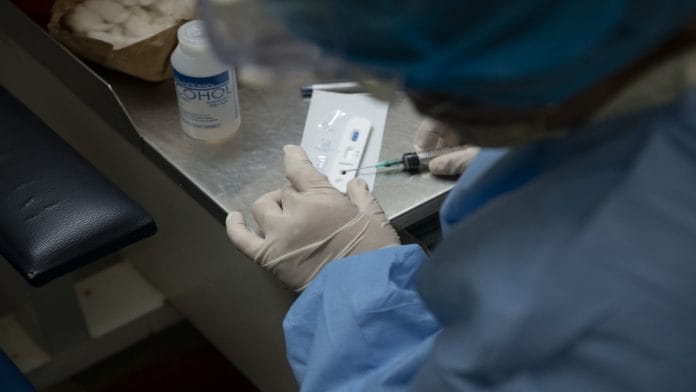As the world reels under the onslaught of the coronavirus, all other maladies seem to have vanished. Only they haven’t. And doctors understand that, which is why they have been advising patients with chronic “non emergent” conditions to stay away from clinics and hospitals.
Early reports on the coronavirus clearly showed that people with diabetes would be at greater risk of adverse outcomes following an infection. Subsequent studies have confirmed that elderly patients with diabetes, high blood pressure, underlying heart disease, cancer or chronic lung issues are particularly likely to succumb to the Covid-19 disease.
Unless people with these conditions have an emergency situation, they should avoid visiting a clinic or hospital. And if they do venture out, they should be at ‘two arm’s length’ from other people. It’s easy for doctors to advise that, but extremely difficult for people with diabetes to let their concerns be overcome by even a raging pandemic.
Also read: ICMR plans plasma therapy clinical trials in 2 weeks to treat critical Covid-19 cases
No escaping diabetes
Diabetes does not go away. India may be under lockdown by the orders of the Narendra Modi government, but your diabetes is not bound by any order. It stays with you, and asks for your attention even as you cope with the much bigger and immediate threat of the Covid-19 pandemic.
Even if you miss your regular appointment with the doctor, you must continue to follow the to-do list — eat the right food on time, exercise for about 45 minutes daily, and examine your feet every day for cuts, blisters or any other injury.
One important point is the testing — self-monitoring of blood glucose using glucose strips, which is mandatory during this period. In fact, as our lifestyle changes during this coronavirus-induced lockdown, people with diabetes should be testing even more frequently. If laboratory support is available, accessible and permissible, get your HbA1c (three-month blood sugar average) test done.
Also read: If you have flu symptoms, tell us — new health ministry advice to detect more Covid-19 cases
Why control diabetes
According to the International Diabetes Federation (IDF), India has an estimated 77 million (or 7.7 crore) people with diabetes. And there are several reasons why we need better control of diabetes during these trying times.
First, doing so will almost certainly improve the outcomes in case someone does contract the coronavirus. All diabetes is not the same. Poorly controlled diabetes in an elderly person with heart and kidney issues is very different from well-controlled diabetes in a fit, active 40-year-old. The outcome of Covid-19 in the latter’s case could well be compared to those infected but without diabetes. The seriousness of the coronavirus infection is very likely to get attenuated with better control of diabetes. This itself is enough reason to ensure good sugar readings.
The second reason why diabetes control is important is the usual one — we need to have a fix on our numbers (sugar, blood pressure, cholesterol) to prevent long-term complications. By taking our eyes off the ball, we are exposing ourselves to long-term complications — eyes, kidneys, feet or heart. They can creep on insidiously even if we are feeling fine. The coronavirus pandemic won’t change that.
The third reason is that when this pandemic abates, we don’t want to restart with a disadvantage. If you have managed your condition well so far, it makes little sense to let it slip out of control and restart from scratch.
Also read: How the humble hydroxychloroquine has become India’s unlikely new global strategic asset
Just do the basics
Things are not as gloomy for a person with diabetes as they are made out to be. Do not lapse into a ‘diabetes distress’ syndrome. All it requires is for you to follow the basics as outlined above. In fact, you have more time to look after yourself during the lockdown. Spend time with the family. Eat home-cooked food. Practice mindful eating. Enjoy some of the things you may have missed. Reading, writing, music, painting, movies — you can do it all. Use your treadmill or static cycle, practise yoga or use an app that guides you to exercise.
Among other things, ensure you have a month’s supplies in advance — no hoarding, but adequate supplies of medication and glucose testing strips, needles etc. are a must. Most importantly, establish contact with your doctor. Most doctors are using some form of technology nowadays — it could be through email, video or even WhatsApp. Please make sure you have connected with them beforehand and confirmed the correct way to communicate or consult. This is critical to avoid panic if you need to contact them.
If you don’t have a BP testing machine, try to procure one at the earliest and start using it. And if you have not taken your flu and pneumonia vaccines, please do so at the earliest chance. They won’t protect you from the coronavirus but will at least prevent its close allies — pneumonia and influenza — from attacking you.
A surging pandemic will undoubtedly impact routine diabetes care, perhaps forever. But if you are smart, follow the basics, and adapt to simple internet-based technology, you will emerge a winner. It is true that there is no substitute for your doctor holding your hand or placing an arm around your shoulder when you are distressed. Many of you share your most intimate secrets with your doctor. That bonding, that relationship, is special and no amount of present-day cynicism can take it away. To replace that with a ‘remote’ video consultation may not be the most appealing. But even this will pass. We will tide over this crisis and things will be better again.
As Buddha said: “Everything that has a beginning has an ending.”
The author is chairman and head of endocrinology and diabetes division of Max Healthcare Hospital. Views are personal.






